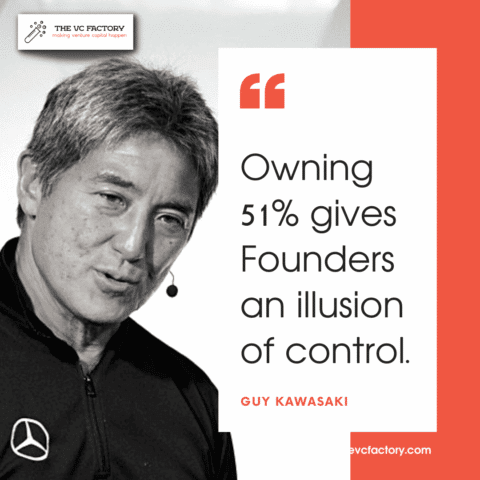“Owning 51% Gives Founders An Illusion Of Control.” – Guy Kawasaki
- 5.0K views
- 17 minute read

Guy Kawasaki is one of the most beloved and recognized figures in the startup world. A former Macintosh "evangelist" and Steve Jobs's right-hand man, he tried his hand at Venture Capital at Garage Ventures, before retaking an evangelist position, this time at the online design platform Canva. While he's primarily famous for pitch-related advice, Kawasaki has a definitive take on a mistake many Founders make, realizing only too late that they had a false sense of reality: wrongly believing they control their startup as long as they have a majority stake.
In this post, I analyze why and how entrepreneurs share operational control and ownership of their companies, how governance is organized in VC-backed companies, why Founders get fired despite controlling voting rights, and which strategy some have pursued to keep their grip on decision-making despite heavy dilution. Finally, I leverage Nobel Prize-winning research to defend a win-win approach to negotiations in Venture Capital.
In This Post
- Why Do Entrepreneurs Share Control of Their Companies?
- Why Guy Kawasaki Claims That Majority Ownership Does Not Guarantee Control
- Dual Class Shares: The Ultimate Founder Control Weapon
- Why Win-Win Agreements Are Crucial in Venture Capital
- How To Resolve Guy Kawasaki's Illusion: The Power of Cooperation
- Conclusion: tl;dr
Why Do Entrepreneurs Share Control of Their Companies?
Guy Kawasaki claims that entrepreneurs do not immediately realize that they should share ownership of their companies. Many don't. Some manage to form large enterprises, but the overwhelming majority create a lifestyle business or a small mom-and-pop operation.
Research shows that many become entrepreneurs because they desire to control their destinies. Entrepreneurship allows them to make decisions, be their own boss, manage their time and resources as they see fit, and create value for themselves. These Founders want to shape a company according to their vision, with limited or no outside interference.
However, as the initial idea grows into a full-fledged company, two external developments may occur with a dilutive impact on Founder control:
- They hire senior executives to take charge of entire business aspects
- They raise funds with financial Investors
Few companies grow tremendously or raise venture capital. Some become successful without VC money. In what follows, I zoom in on tech startups and scaleups to discuss how control is shared.
Sharing Operational Control
This one can be difficult to swallow, as entrepreneurs typically want to remain in complete control of their ventures. However, sharing day-to-day management is often necessary to achieve growth. Most entrepreneurs lack expertise in areas required for running a successful business.
To compensate for this gap, they either band with co-Founders possessing complementary skills, or hire senior executives highly skilled in those domains. By doing this, entrepreneurs can benefit from the expertise of these proven achievers, but have to share decision-making control with them. This combination of additional insights, experience, and knowledge often leads to exceptional results for the business.
Two recent examples illustrate this point:
- Google's Founders, Larry Page and Sergey Brin, hired Eric Schmidt to help them grow the company. VC firms had flagged the duo's lack of business experience.
- Facebook's Founder, Mark Zuckerberg, hired Sheryl Sandberg from Google to run the social media's monetization strategy.
These two examples represent outliers. Nevertheless, sharing some control is necessary for any entrepreneur who wants to build a successful venture. Read the post below for why top VC firms passed on Google's Series A round.
Sharing Equity Ownership
By allowing Investors to take ownership through equity investments, Founders can obtain the capital they need to develop their business further. Investors sometimes also bring invaluable experience and connections that can help startups accelerate their growth.
Ultimately, the goal for entrepreneurs is to find a balance between retaining sole ownership and access to resources. Equity dilution is seen as a necessary evil. The trade-off is clear: the Founders’ share of the pie is smaller, but they may increase the total size of the pie thanks to the additional capital injected.
VC firms also typically require Founders to set aside a minimum percentage of the equity for employees—up to 15% of the fully diluted shareholding. A startup ESOP (Employee Stock Ownership Plan) is a program through which startups offer employees an ownership stake. This type of plan allows employees to purchase shares at a discounted price, and provides them with options for when to exercise their rights to buy or sell shares.
The goal of a startup ESOP is to incentivize employees, increase loyalty, and give them a sense of ownership. By becoming shareholders, employees are more likely to take pride in their work and better align their interests with the company's success.
ESOPs further increase the number of shareholders. Having multiple part owners requires business partners to organize governance, i.e., how decisions are made.
Why Guy Kawasaki Claims That Majority Ownership Does Not Guarantee Control
In VC-backed startups, governance is shared between Founders and Venture Capitalists. This means that Investors have a say in the company’s decision-making process. They will try to influence key decisions throughout the life of the venture. The Board of Directors is the forum where such decisions are debated.
What Is A Board And What Does It Decide?
A Board is a group of individuals who guide and oversee a startup. It typically consists of the Founders, senior executives, Investors, and other advisors.
Board members review the progress and performance of the organization on an ongoing basis by reviewing financials and other information provided by the management team. They also discuss and make decisions about strategy, investments, operations, staffing, and other matters impacting long-term success.
Having a strong Board can help a startup better navigate challenging times and ensure it will remain successful. Recent Board-related failures such as Theranos and FTX showed how damaging it could be not to have a proper Board in place.
A great board is a highly-engaged group who knows your business intimately.
Mark Suster - Upfront ventures (Source: Managing your startup board)
Even in VC-backed companies, Founders and their managers retain control of the day-to-day operations. They present a yearly budget to their Investors and do not need to get Board approval as long as they are within budget.
However, VC Board directors must approve critical strategic decisions, especially when they impact the value of their stake in the company.
Shareholders' Agreement & Veto Rights
Although the term sheet offers a summary of governance terms, the shareholders' agreement (SHA) is the document laying out each party's prerogatives after the closing. The objective is to make sure things go as smoothly as possible. Like every contract, the SHA also serves as a reference and negotiation point when things start going awry.
In order to protect their interests, VCs secure veto rights over certain strategic decisions, such as hiring or firing key personnel or changes to capital structures.
Examples of veto rights include:
- Change in bylaws, articles of association, or the principal business of the company
- Dissolution
- More debt, capital expenditures, or spending than previously budgeted (with preset thresholds)
- Issuing new stock on parity with, or senior to, the preferred stock
- Dividend payment
- Changing the composition of the Board
The list varies depending on the jurisdiction, the stage the company is in, and sometimes the state of the VC market. In recent times, Founder-friendly operators such as Tiger Global and other crossover funds routinely offered money without strings attached.
Founders need to understand these rights when negotiating contracts with Investors as they can determine the level of control over their businesses. VCs must also master term sheet clauses to adequately negotiate terms with entrepreneurs.
Guy Kawasaki Warns Founders of Their Moral Obligations
Guy Kawasaki points out in his presentation The Top 10 Mistakes of Entrepreneurs (where this quote originates) that he never saw anything come down to a vote in a Board meeting.
Not only do disagreements tend to be hashed out beforehand, but it is also rare for Founders to outvote their VCs. Veto rights skew decision-making, as VCs have a de facto blocking vote on critical decisions.
The moment you take outside money, you have lost control of the company.
Guy Kawasaki
Additionally, Venture capital is a small industry, and VC firms often invest together in deals. On many occasions, such as a strategic pivot or an early exit proposition, Founders' and Investors' interests diverge entirely.
A Founding team systematically acting against the advice of its Investors or trying to outmaneuver them may get “burnt” for future financing rounds. Or, as we will see in our case studies below, be forced to resign the moment they need fresh capital for the startup's survival.
Founders should be aware of the additional dimensions they sign up for when they take outside money—particularly their moral obligations. Over time, some Founders devised new strategies to retain control even as their equity ownership got diluted.
You've reached a Members-only area.
Unlock Full Access
Discover exclusive content curated for Venture Capital professionals and enthusiasts. Join our community and gain unlimited access to in-depth articles, expert guest interviews, MBA-level webinars, and networking opportunities.
Register for our 7-Day Free Trial: Click Here
Already a member? Please Log In Below:
Subscribe to our Newsletter
Join 12,000+ VCs & Founders globally who enjoy our weekly digest on Venture Capital. We keep your information confidential and you can unsubscribe at any time. Sweet!

